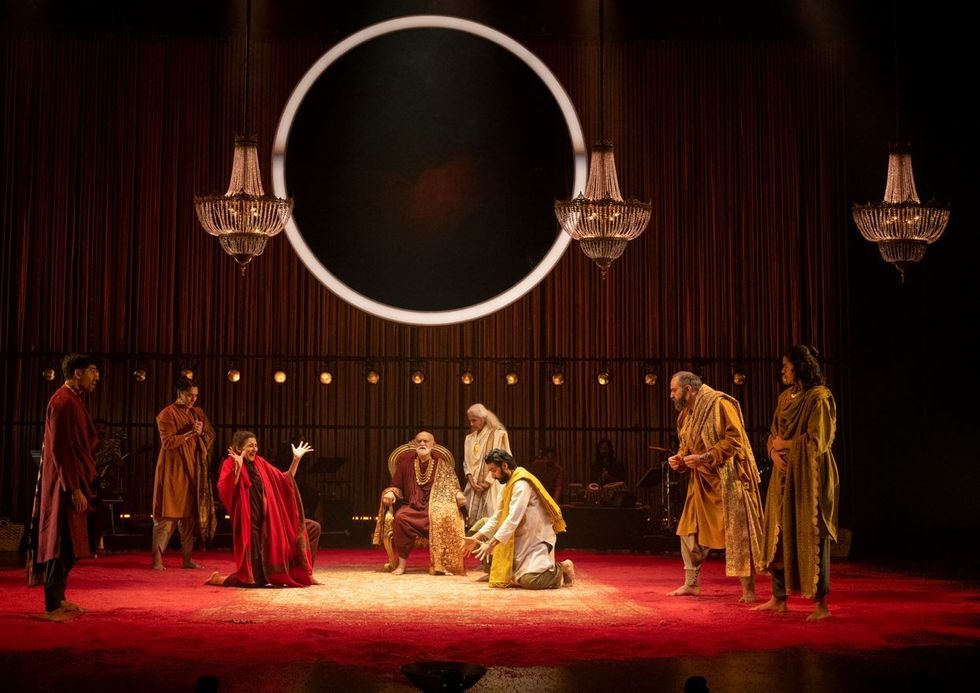LONDON’S Barbican Theatre will soon reverberate to the sounds of “operatic telling” and dramatic, ancient Indian dances as it is set to host a fresh two-part adaptation of the Indian epic, the Mahabharata, on October 1.
Canada-based Why Not Theatre has adapted this ancient work into a “more accessible form of art” for global audience and created what is described as a once-ina-generation theatrical experience.
The fresh take on this 4,000-year-old epic is written and adapted by co-artistic directors, Ravi Jain and Miriam Fernandes.
Jain told Eastern Eye, “It took almost nine years of working on it, writing and rewriting. It’s been great, because we have been working with a bunch of south Asians. “A lot of people didn’t really know the story well and we all had to drown in it before we could start to swim and see where the horizon was.”
A tale of warring royal cousins, the Pandavas and the Kauravas, the Mahabharata narrates the events leading to and aftermath of the battle of succession in Kurukshetra (in north India). At 200,000 verse lines and some 1.8 million words, it is considered the longest epic poem ever written, and has been adapted into TV shows, theatre and movies.
Jain, who was born to Indian immigrant parents in Toronto, revealed how the project came about. He said, “Sometimes you don’t pick projects, projects pick you; I feel like that’s kind of what happened here.”

“In 2015, I was commissioned to do a play in Toronto. While writing, I had a picture showing an image from the Bhagvad Gita on my desk. It was a simple postcard, but the image was so strong that it deeply moved me and I dove into the Gita and obviously, in the process, into the Mahabharata too.”
The more he read, the more he felt excited about the possibility of bringing this epic tale on stage.
“Coincidentally, around the time, Canada Council, one of our arts funders, introduced the next chapter fund - which was a big dream project fund. We applied and got it,” Jain said.
He admitted to feeling “overwhelmed” by the idea of bringing the Mahabharata on stage as it felt “too big”. “Eventually I calmed down,” he recalled.
In 2018, Fernandes came on board and the play began to take shape. However, the Covid pandemic brought the process to a halt.
Jain said, “We were about to start rehearsals when the pandemic hit. We threw it (draft) out and started all over again, which turned out for the best.
“During the pandemic, everyone was asking such big questions - ‘what is life, what is my responsibility on this planet?’” which are still unanswered. “For me, it (pandemic) really crystallized the idea of privilege and that really got us to pulling up the thread of our play around dharma, the responsibility of those with the most privileged to take care of those with the least to build a proper society.”
The difference between humans and animals is that humans can feed other people, Jain explained, saying it became clear to him during the pandemic that this is how he wanted to share the story of the Mahabharata (as well as the Bhagvad Gita), with the world.
Jain’s adaptation features the classical Indian dance forms Odissi and Kathakali. The latter is used to show off the martial skills of the warring princely cousins – the Pandavas and Kauravas.
The Mahabharata also features an “operatic telling of the Bhagvad Gita”, composed by Suba Sankaran and John Gzowski, performed in Sanskrit by multidisciplinary artist Meher Pavri. Jain said, “What can be a better way to represent the Bhagvad Gita on stage other than taking the highest form of theatre, the opera, considering it to be a conversation between a human and god; I figured it was not possible to convey it easily in mere words and, that too, in a limited time.
“The opera singer’s notes of Sanskrit shlokas vibrate in your soul. The Gita can’t be understood through mere words. It’s a feeling and that’s what changes us.”
Members of the cast include Goldy Notay, Ajay Chhabra, Shawn Ahmed, Karthik Kadam, Neil D’Souza, Jay Emmanuel, Varun Guru, Navtej Sandhu, Darren Kuppan, Anaka Maharaj-Sandhu, Suma Nair, Ellora Patnaik, Sakuntala Ramanee, Ronica Sajnani, Ishan Sandhu, Munish Sharma and Sukania Venugopal.
Jain said, “We started the casting process in London in 2017. We were very clear from the start that we would have an international south Asian cast. We were also conscious of the sort of cultural difference between north and south India.”
The play features composers from both the genres, he said.
“Also, I don’t really like to follow directives around gender casting, so men are playing women and women are playing men a lot in our version,” Jain said, adding that a non-binary person plays the key character of Arjun, while other main characters – Bheeshma and Karna – are played by women.
In March, the world premiere of the Mahabharata at the Shaw Festival in Canada was met with a huge response, garnering rave reviews for the play.
Jain said: “Audience recognised themselves in the story in a way they never imagined they could. White Canadian audiences were just blown away by the stories. We managed to appeal to those who know the Mahabharata and those who don’t.”
What really surprised the audiences in Canada was how contemporary it was, and yet how relevant it felt, he said.
The Mahabharata, particularly the Bhagvad Gita, is contextual and has a lot of room for interpretation, Jain said.
He and his team have “done a good job of trying to keep it specific, but also keeping it open enough so that someone can have their own experience with the stories”.

The play is split into two parts: Mahabharata: Karma – The Life We Inherit, and Mahabharata: Dharma – The Life We Choose. It can be watched either separately or back-to-back. The total running time is a little more than six hours.
“When you fly from Canada to Lon[1]don, the flight is six hours. And you go on that flight for a reason because you know when you arrive, you are going to be somewhere else and that’s why we happily invest that time in the journey. Just like that, investing those hours in this play is totally worth it,” Jain said.
The two-part production of the Mahabharata will run at the Barbican Theatre, London, from October 1 to 7






 Naeli and the secret song
Naeli and the secret song








 Jamie Lloyd’s Evita with Rachel Zegler set for Broadway after London triumphInstagram/
Jamie Lloyd’s Evita with Rachel Zegler set for Broadway after London triumphInstagram/
 A compelling premise, layered and unpredictable charactersAMG
A compelling premise, layered and unpredictable charactersAMG Anyone who enjoys a gripping story with a diverse cast and unexpected twistsHarperFiction
Anyone who enjoys a gripping story with a diverse cast and unexpected twistsHarperFiction
 The Story Teller by Ley Roberts
The Story Teller by Ley Roberts Summer Exhibition coordinator Farshid Moussavi, with Royal Academy director of exhibitions Andrea Tarsia in the background
Summer Exhibition coordinator Farshid Moussavi, with Royal Academy director of exhibitions Andrea Tarsia in the background An installation by Ryan Gander
An installation by Ryan Gander A sectional model of DY Patil University Centre of Excellence, Mumbai, by Spencer de Grey
A sectional model of DY Patil University Centre of Excellence, Mumbai, by Spencer de Grey Rituals and Identity and Theatre of Resistance by Arinjoy Sen
Rituals and Identity and Theatre of Resistance by Arinjoy Sen
 An explosive new play that fuses biting satire, history and heartfelt storytellingPleasance
An explosive new play that fuses biting satire, history and heartfelt storytellingPleasance